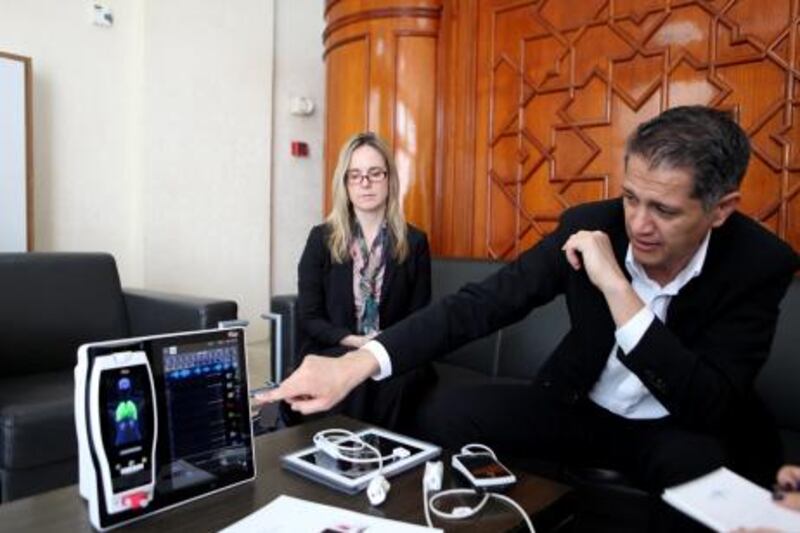ABU DHABI // A local hospital hopes to save lives with new technology that can continuously measure the blood’s haemoglobin levels in a non-invasive way.
As it stands, a blood sample is taken by pricking the index finger. The sample is sent to the laboratory for testing and the results shared with the doctor in a process that takes about 15 minutes.
But Mafraq Hospital plans to do away with needles and use wavelengths of light similar to those in a pulse oximeter, which measures oxygen levels in the blood.
This technology would be a lifesaver in the operating theatre, said Dr Bunna Eng-Tusitala, manager of the hospital’s burns unit.
“We can use it during surgery to see how much blood loss the patient has sustained and it would mean faster action in terms of giving them any blood transfusion they need,” Dr Eng-Tusitala said.
“We can react to the result immediately instead of waiting for it to come through.”
The technology is the only available non-invasive haemoglobin monitor approved by the United States Food and Drug Administration. It is made by the global company Masimo.
It can also measure hydration levels, which used to require catheterisation.
Haemoglobin monitoring is particularly important in the UAE, where about half of the Emirati population are carriers of thalassaemia.
Those who develop the disease often have severe anaemia and require blood transfusions for the rest of their lives.
Academic studies show high prevalence of anaemia in the Emirates.
A 2004 study of 496 pre-school students by UAE University found that 36 per cent were affected. A 2007 study by the University of Sharjah on 238 female college students found 27 per cent had anaemia.
The technology would also help burns and trauma patients. The hospital, on a junction between Abu Dhabi, Dubai and Al Ain, often receives patients who are severely injured from traffic accidents.
“The majority of trauma patients suffer low haemoglobin levels because of heavy blood loss,” Dr Eng-Tusitala said.
“Major burn patients have low haemoglobin at least once or twice during their treatment period because they receive a lot of surgery.”
Blood experts advise, however, that such technology should be approached with caution. Dr Laila Al Shaer, head of the Dubai Blood Donation Centre, said it was not yet reliable for blood donation.
“Because this is still new, there is no proficiency testing so we can’t benchmark it against international standards,” Dr Al Shaer said.
“Being able to do this is very important and one of the reasons why we’re accredited by the American Association of Blood Banks.”
The technology’s accuracy is plus or minus 1 gram for each decilitre, compared with 0.3g for lab tests.
But the technology has great potential for hospitals, Dr Al Shaer said.
An independent study of 106 patients by Cairo University last year showed use of the technology resulted in 56 per cent fewer transfusions.
It showed once doctors determined a blood transfusion was needed, they were able to start the procedure in about nine minutes, compared with 50 using the traditional method.
Another random trial of 327 orthopaedic surgery patients at Massachusetts General Hospital in the US showed that using the technology reduced the number of blood transfusions by 90 per cent.
“This is huge, because not only is blood scarce but transfusions are also dangerous as they typically increase mortality significantly,” said Joe Kiani, chief executive of Masimo.
The Abu Dhabi Blood Bank requires between 2,000 and 2,500 donations – each donation is 450 millilitres – a month to keep up with demand but only receives about 250.
Up to 400 haemoglobin laboratory tests are conducted daily at Mafraq, costing Dh30 each.
Under a contract, it would be provided the new devices at no cost but would have to pay for a certain number of the disposable probes that wrap around patients’ fingers.
For the spot-checker, the Pronto-7, with non-disposable probes, each test costs US$2 (Dh7.34). For the continuous monitor, the Radical-7, the finger cuff can be used for the patient’s entire stay and costs between $60 and $70 each.
The hospital has recommended the device to Abu Dhabi’s health services company Seha and is awaiting its approval for 27 continuous devices.





